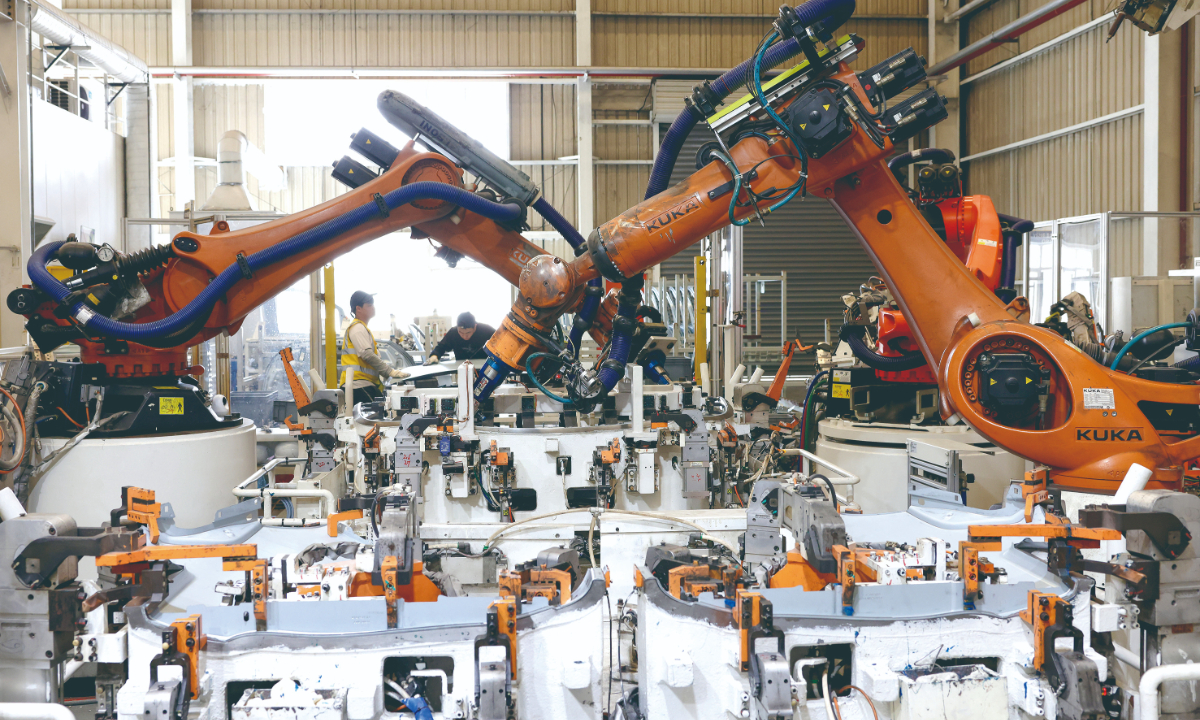(Source:Global Times,2024-10-15)

An intelligent production line of EV components in Fuzhou, East China's Fujian Province Photo: VCG
Chinese experts on Tuesday urged the European Commission (EC), the executive body of the EU, to show sincerity in the ongoing negotiations with China over the dispute on electric vehicles (EVs), after the EC chief said that negotiations would continue even if additional tariffs entered into force.
Speaking alongside German Chancellor Olaf Scholz in Berlin, Germany on Monday, EC President Ursula von der Leyen said that the EU was negotiating with China on mechanisms such as price commitments or investments in Europe as a solution to the EV dispute, Reuters reported. Scholz expressed hope of reaching an agreement by the end of October.
What could be the compensation that is offered instead of countervailing duties, for example? And there is the question of price commitments that are on the table, investments in Europe, von der Leyen was quoted by Reuters as saying. These are all questions that are on the table, as always in negotiations. Everything has only been negotiated when the last piece has been negotiated.
The remarks came as the EU prepares to impose hefty additional tariffs on Chinese EVs, and as recent negotiations have not yielded any mutually acceptable deals.
On September 19, Chinese Commerce Minister Wang Wentao held talks with EC Executive Vice President and Trade Commissioner Valdis Dombrovskis, and the two sides agreed to keep trying to find a mutually acceptable solution through friendly consultations. Starting on September 20, technical teams of the two sides had conducted eight rounds of intensive consultations in Brussels over 20 days, with important progress made in some areas, China's Ministry of Commerce (MOFCOM) said on Saturday.
However, regrettably, the EU side has never responded positively to issues involving the core concerns of the Chinese and European industries. There are still major differences between the two sides. So far, consultations have not reached a solution acceptable to both sides, the MOFCOM said in the Saturday statement.
The MOFCOM stressed that China's attitude and sincerity in seeking solutions through dialogue and consultations have remained unchanged, and China has formally invited the EU side to send a technical team to China as soon as possible to continue a new round of face-to-face consultations.
Experts said that von der Leyen's Monday remarks about continuing talks were likely aimed at responding to growing concerns among some EU industries, particularly the auto industry in Germany, over the potential repercussions of the EC's protectionist actions.
Such ambivalent remarks, to a certain extent, aim to respond to main concerns within the EU, Jian Junbo, deputy director of the Center for China-Europe Relations at Fudan University's Institute of International Studies, told the Global Times on Tuesday.
Jian noted that in her remarks, von der Leyen stressed leveling the playing field while apparently leaving room for a potential solution through negotiations.
However, actions speak louder than words, and if the EC genuinely seeks a mutually acceptable solution, it should show sincerity in the negotiations and meet China halfway, Chinese experts noted.
China has shown its utmost sincerity and flexibility, and if the EC insists on its own way, it will go too far along the wrong path, Li Yong, a senior research fellow at the China Association of International Trade, told the Global Times on Tuesday, noting that the Chinese side has brought up various solutions in order to avoid such an unnecessary trade dispute.
In September, the MOFCOM criticized the EC's rejection of price offers from Chinese EV producers, saying that the move showed the EC's lack of sincerity in addressing the dispute through dialogue.
Moreover, the EC chief's remarks on Monday also do not change the fact that the EC's additional tariffs on Chinese EVs are protectionist in nature and in violation of WTO rules.
The additional tariffs run counter to WTO principles and market competition law, and they are a crackdown on China's industrial upgrade, Jian said.






